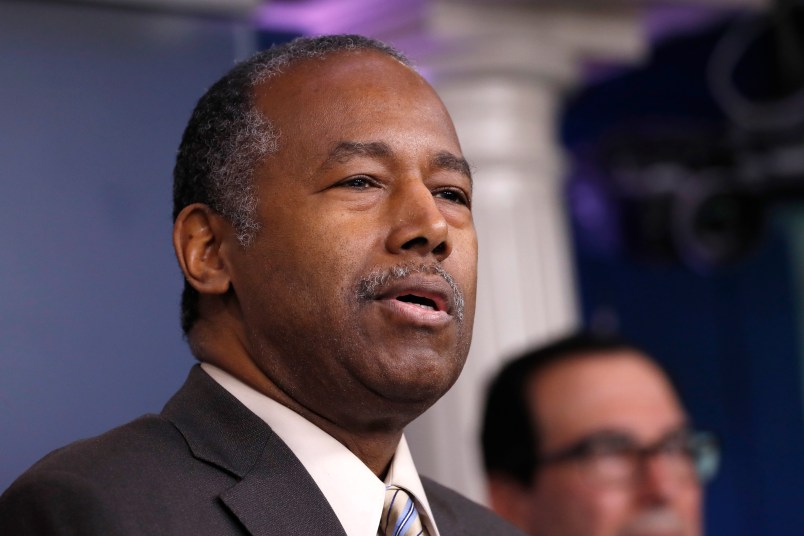NEW YORK (AP) — Most Americans who rent their home, many of whom have lost their jobs in the sudden economic slowdown caused by the coronavirus outbreak, will not be eligible for eviction protections, despite what President Donald Trump said this week.
Under the Department of Housing and Urban Development’s plan released Wednesday, foreclosures and evictions would stop for 60 days on single-family homes with loans through the Federal Housing Administration. That would apply to roughly 8 million units, according to HUD. Only FHA homes lived in for at least a year can be rented out.
That’s compared with the roughly 43 million households who rented in 2019, according to the U.S. Census. Roughly half of renters rent their home from an individual investor, while the other half rent from a business or multi-unit property owner. The ones renting from a business will not receive any protections according to HUD’s proposal.
“That’s the problem with (HUD’s proposal). It only impacts a very small amount of people. We need big-scale solutions,” said Andrea Shapiro of the Metropolitan Council on Housing, a New York-based housing advocacy organization.
Furthermore, HUD has no power to protect renters in public housing authorities located across the country. HUD Secretary Ben Carson said this week on Twitter that the agency is working with Congress to get that authority to protect renters in public housing authorities.
“HUD has been in contact with every Public Housing Agency in the country to ensure the millions of low-income Americans we serve continue to have a roof over their head,” Carson said.
The rules are in contrast to comments made by Trump this week, who said renters would get “immediate relief” as part of his administration’s plan.
Housing advocates called the White House’s proposal an “important first step” but said there are limitations to the policy that need to be addressed.
“America’s lowest-income renters were already struggling to pay rent and make ends meet before this latest disaster, and people were experiencing homelessness. Congress must implement a national moratorium on all evictions and foreclosures,” said Diane Yentel, president and CEO of the National Low Income Housing Coalition.
Renters tend to be more economically vulnerable than their homeowner counterparts. They have generally lower incomes and cannot tap into the equity in their homes as a line of credit in case of an emergency. A disproportionate number of renters are black, Hispanic and other minorities.
Some cities and states, including San Francisco and Los Angeles, New York state and Kentucky, have imposed their own eviction and foreclosure moratoriums in response to the coronavirus. But the majority of states and localities have yet to step in to stop people from losing their homes.
Shapiro said the best solution at the moment would be a national moratorium on both rental payments and mortgage payments.
“Everyone needs protections right now,” she said.
___
AP Race and Ethnicity Writer Aaron Morrison contributed to this report from New York.







I’m sure that uncle Ben will get right on that.
Well the owners probably won’t find any new renters so still won’t have any money. And as a land lord I can say if you have a good renter you better hang on to them cause there are a lot that will cost you more than the rent you get!
Of course they won’t be protected. You can’t create Trumptowns (modern day Hoovervilles) without mass evictions, now can you?
Evictions require legal proceedings and then the presence of law-enforcement officials to enforce the order. I’m not seeing that proceeding terribly fast, at least until we’re somewhat further along. But the executive and congress have to get their act together before then.
I know from personal experience a bad tenant is MUCH more costly than a vacancy.
What housing advocates fail to get is that good tenants and good landlords have a mutually beneficial symbiotic relationship.
But these are times of crisis. We need a blanket 90 day (at least ) moratorium on all evictions .
Also landlords who rent out their own home need to have an equal amount of protection with their mortgage holders if the tenants can’t make rent.